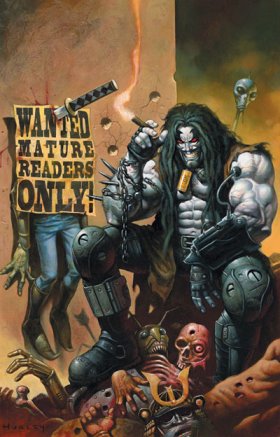|
Lobo
Unbound #1
writer: Keith Giffen
artist: Alex Horley
Often
misinterpreted, originally ultra-violent, in recent years
the savagely hilarious bounty hunter Lobo has become watered
down by the needs of the greater DC Universe. Maybe it was
the appearance on Superman: The Animated Series. Maybe
it was marketing's decision to release him as a plush toy.
Or maybe
the thing that drew readers to him in the first place made
him completely unfit for the DC Universe. As brilliant as
they often are, Keith Giffen creations usually fall into that
category. Anybody out there for The Heckler?
But still
(at least until recently), DC fans demanded that everything
popular somehow fit together. The Main Man had to co-exist
with Superman.
Occasionally
it worked, such as when Lobo crossed paths with The Demon,
but it was also clear that the Lobo appearing in L.E.G.I.O.N.
(and then R.E.B.E.L.S.) looked less and less like the guy
who took down Santa Claus.
The last
straw in the destruction of Lobo came with his reversion to
teendom and subsequent teaming with Young Justice. From a
storytelling perspective, it made a strange kind of sense:
bored with being the toughest tough guy in the universe, the
only way to keep from going insane was to have to earn his
reputation all over again. On the surface, it seemed clever,
but though Teen Lobo made the character safe for kids, this
incarnation pretty much took away the original's balls.
Well,
they're back, along with Lobo's creator.
Often
when a cult creator returns to a character after a long absence,
the actual work can't live up to the fan anticipation. Marvel's
recent luring of Steve Gerber to Howard The Duck comes
to mind as a book and attitude that was once perfect for its
time that couldn't recapture the magic. Happily, Giffen still
has the sick, sick magic that made his name in the second
place. (The first place would be his artwork on Legion
of Super-Heroes in the early '80's.)
Lobo
Unbound is twisted. It's wrong. And you've got to get
it.
Since
Teen Lobo is nowhere to be found in the current Graduation
Day mini-series, I guess it's safe to assume he's been
kicked out of the DC Universe for a while. That leaves the
field clear for the true Main Man to return to fragging.
The book
opens with a brief reintroduction of Lobo's past, done Dr.
Seuss style. As often happens with Seuss pastiches (and they
happen waaay too often), it's a mixed bag. The joke goes on
too long, and the rhymes barely work. If Lobo were here, he'd
frag me for being so damned effete. And for using the word
"effete." I accept the risk.
Soon
enough, we get to the action, as Lobo takes on galactic film
mogul Huevos Gigantes, whose name describes his attributes,
and yes, after Giffen has toiled on the fringes of the film
industry for a few years, perfectly fits what he does for
a living.
And that's
just in the first half of the book. Later, to describe the
Blue Ointment Boys who send Lobo on his next mission would
be to ruin one of the sickest jokes Giffen has come up with.
Like
Giffen, Lobo has returned to his roots. Yes, he's the toughest
bastich in the universe, but he lives in a dingy, seedy little
apartment. By choice. He hangs with a rough crowd because
that's the only thing that gives him anything close to joy,
short of mass destruction. Maybe we'll see his space dolphins
again, but I doubt it. They don't fit.
Though
Lobo has often been drawn by artists with a flair for the
grotesquely ridiculous, such as Simon Bisley, Giffen may have
finally been paired with the perfect artist for his sensibilities.
Alex Horley has a dark painted style that recalls Bisley and
Dan Brererton, but channels Harvey Kurtzman. It can be no
accident that Mr. Gigante's secretary looks like Little Annie
Fannie. Many panels teem with throwaway visual gags just like
the best of that classic strip.
What
Giffen created, and later hands forgot, is a satire. And so
it's only appropriate that this book should pay homage to
one of the masters of comic book satire.
Lobo
doesn't have an origin rooted in sadness like The Punisher.
Even though Frank Castle can be used for black humor (and
often is, brilliantly, by Garth Ennis), he still has an air
of realism. And a code of vengeance that we can almost understand.
But Lobo
- he's just himself. Capable of anything, loving violence
for no other reason than that's what he is.
And if
having Giffen back on the character isn't enough, it gets
better: issue number 4 of this series brings back the character
most overdue for a respectful revival: Ambush Bug.
Gang,
if that doesn't get you to buy this mini-series, you're
beyond hope.
Rating:
 (because
of that Dr. Seuss intro) (because
of that Dr. Seuss intro)
|






